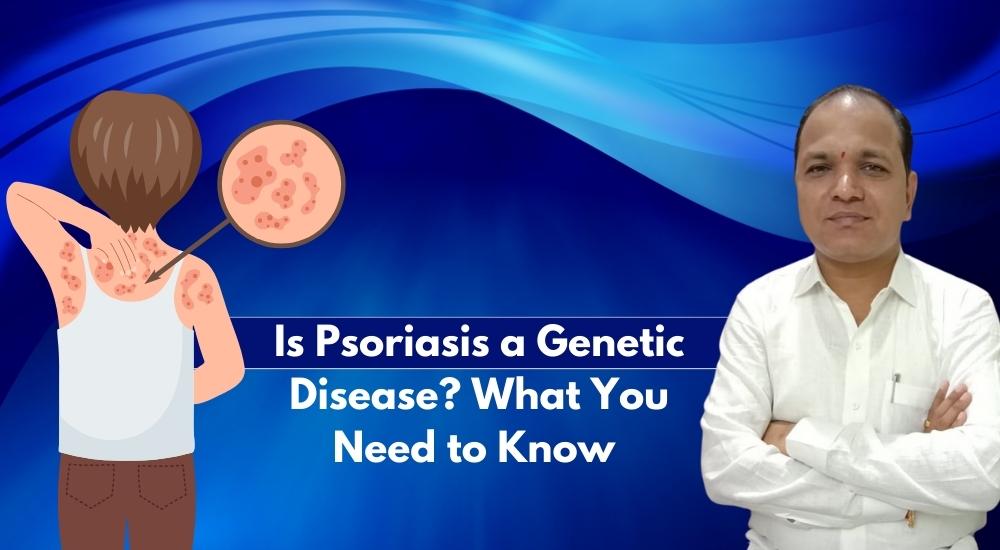One of the chronic skin diseases that victimizes millions worldwide is psoriasis. It presents as red patches of skin covered with silvery scales on various parts of the body, such as elbows, knees, scalp, and lower back. The disease upsets the appearance of the skin but troubles it and gives a sense of emotional disorder due to its visibility. Many patients ask this question: Is psoriasis a genetic disease?
In this post, we will explore how genetics are interlinked with psoriasis and how Ayurveda, particularly the of psoriasis expert Yogesh Vani in Surat, can effectively manage the condition in Surat, India.
Understanding Psoriasis: A Chronic Autoimmune Disease
It generally falls under the category of an autoimmune disease. As such, it results in a false immune attack on healthy skin cells. This also leads to a rapid turnover of skin cells, giving characteristic thick scaly plaques in the skin. The cause of psoriasis is not fully understood, although it is believed to have elements of both genetic and environmental factors.
One of the most common questions patients ask is: Does psoriasis run in families? The answer is: yes. There has also been a great amount of research to show that there is a strong genetic component in the development of this disease, but genes alone cannot trigger the disease. There is also another significant role for environmental factors in the onset and progression of the disease.
The Genetic Link to Psoriasis
Several scientific studies have well evidenced the genetic predisposition to psoriasis. The condition is mostly family-trended. Therefore, individuals who have a history of the illness in the family will end up developing the disease. According to various research findings, if one of the parents suffers from psoriasis, then there is an approximate 10-15% chance of the child developing the disease. Conversely, if both parents suffer from the disease, the percentage will most likely increase to 30%.
The Role of Genetics in Psoriasis
The most important step forward in understanding genetic predispositions to psoriasis was taken in the discovery of multiple loci of genes connected with the disease. The most common among them is the HLA-Cw6, which is related to increased susceptibility to the onset of psoriasis.
It is associated with the regulation of the immune reaction in the human body, and an improper and triggered by mutations, immune reaction is the cause that brings about psoriasis.
Other genes that have been associated with psoriasis include immunomodulatory genes and genes that regulate skin cell turnover. Important to note is that although these genetic factors predispose one to developing psoriasis. They never really guarantee that the person will actually develop psoriasis.
Other genes that have been associated with psoriasis include immunomodulatory genes and genes that regulate skin cell turnover. Important to note is that although these genetic factors predispose one to develop psoriasis, they never really guarantee that the person will actually develop psoriasis.
Environmental Factors That Trigger Psoriasis
While genetics sets down the actual foundation for the disease, several environmental factors can trigger or provoke it in the predisposed person. Those triggers include:
- Stress: Through emotional or physical situations, many refer to stress as one of the most common causes of flare-ups of psoriasis.
- Infections: Guttate psoriasis is an appearance of tiny drop-like formations on the skin that characteristically develops after infection with strep throat and other infections.
- Medications: Some medications may trigger the appearance of psoriasis or worsen the existing symptoms, including certain beta-blockers, lithium, and antimalarial drugs.
- Skin Injuries: Skin trauma – cuts, scrapes, sunburn, or any other skin lesion – can provoke flare-ups at the moment of injury in the affected areas (Koebner response).
- Diet: Although there is no established relationship between diet and psoriasis. Some patients report flare-ups triggered by specific foods or beverages, such as alcohol, red meat, and processed foods.
How Ayurveda Can Help Manage Psoriasis
Although conventional treatments like topical steroids, phototherapy, and systemic medications can keep the symptoms of psoriasis. They often are taken with side effects, and patients lose the beneficial effects of the treatment after some period. India has an ancient traditional system of medicine, Ayurveda.
According to this Ayurvedic approach, treatment for psoriasis aims at solving the inherent as well as the apparent causes of psoriasis. The ayurvedic approach from Dr. Yogesh Vani in treating psoriasis includes aspects of being complete as well as patient-specific.
He applies ancient time-tested Ayurvedic principles coupled with a deeper modern understanding to provide treatments that help in dealing with both intrinsic and extrinsic factors causing psoriasis.
Here’s how Ayurveda can help:
- Detoxification: Ayurveda speaks about the removal of ama from the body. Ama is formed by poor diet, stress, and environmental conditions. Ayurvedic detox methods, Panchakarma, perform cleansing work that helps to remove toxins and reduce inflammation inside the body, thereby improving the skin a lot.
- Herbal Remedies: She prescribes some of the strongest Ayurvedic herbs. Such as Neem, Turmeric, Aloe Vera, and Kutaj, which reduce the inflammation in the skin and make a balance between the doshas by enhancing the quality of the skin. All these herbs are naturally anti-inflammatory, antimicrobial, and healing in nature, thereby making them a good remedy for curing psoriasis.
- Dietary Guidance: Ayurveda accords a lot of importance to diet with regard to health and well-being. The doctor prescribes individual diet recommendations to balance the Pitta dosha. It means that an individual requires fresh fruits, vegetables, and whole grains as cooling and anti-inflammatory. He or she must avoid spicy, oily, and processed food that may worsen his or her condition.
- Topical Treatments: Ayurvedic topical treatments include, among others, herbal pastes and oils that have nourishing and healing properties for the skin. Hence, ingredients such as sandalwood, turmeric, and neem oil soothe the skin and take out all scaling and irritation.
Conclusion
Genetics plays an important role in the development of psoriasis, environmental factors, lifestyle, and stress contribute greatly to its development and progression. Conventional treatments have been symptomatic in their approach, but Ayurvedic medicine has today emerged as a natural, holistic measure to address the root causes of disease in managing psoriasis.
Dr. Yogesh Vani, with his vast expertise in Ayurvedic treatment. It deals with the problem of psoriasis not only by managing the symptoms but also by healing the body, mind, and spirit. If you have been bothered by psoriasis problems and you wish for a solution that is more natural and has durable relief, then the Ayurvedic treatments by Dr. Yogesh Vani could be what your body needs to heal.




